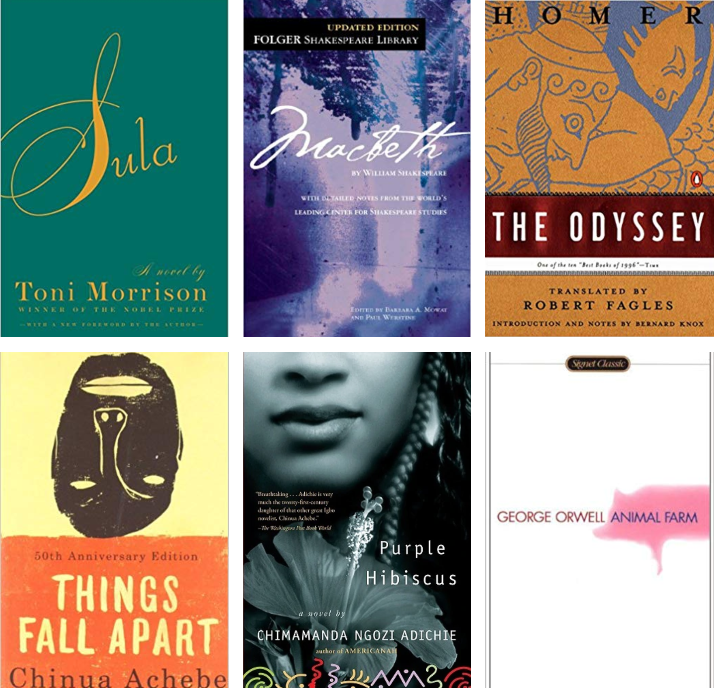Freshperson Required Reading: A Definitive Ranking from Grace and Kemi
For years, the freshpeople of Berkeley Carroll have gone through a particular rite of passage: required reading. Each year, they dutifully page through six novels of varying lengths and topics. More power to you, freshpeople! As sophomores, we’ve decided to answer the question on everybody’s minds: Which book was a flop, and which comes out on top? While addressing this most dire question, we’ve decided to rank them (in descending order) from worst to best.
- The Odyssey
The Odyssey, by Homer, is at the bottom of this list. It was extremely confusing, and was way too long for our teachers to genuinely expect us to read it or for anybody to truly go into depth with annotations. According to www.readinglength.com, The Odyssey has 560 pages, all of which we deeply wish to forget. Not a single sentence of it was easy to understand, and skipping chapters to save time didn’t exactly help our comprehension. Why is Odysseus doing that? Did he have to go to that island? It’s been a year, and we still don’t know. However, one thing we do know is that a solid 75-85% of the ninth grade is going to write their final essays about—you guessed it—Penelope!
- Things Fall Apart
Things Fall Apart by Chinua Achebe comes in second-to-last on this list. This story was required reading for Modern World History, and still comes back to haunt us every now and then in our 10th grade history courses. Here are some personalized comprehension questions for BC’s freshpeople: Why did Okonkwo kill Ikemefuna? How did Okonkwo accidentally kill someone’s son? We ourselves don’t know the answer, but hopefully you do! 0/10, would not recommend.
- Purple Hibiscus
Chimamanda Ngozi Adichie’s Purple Hibiscus is, of course, required freshperson reading in Myths and Legends. It contained an interesting story, and managed to keep us engaged throughout. However, a severe lack of context for the book (What was happening in post-colonial Nigeria? Why didn’t we learn until after we read the book?) and a slow pace at times places this novel squarely in the middle of this list. Unfortunately, this piece of literature has been removed from the freshperson curriculum, so incoming freshpeople will never know the joy of finally understanding the book three months later.
- Macbeth
Coming in at #3 on this list is Shakespeare’s Macbeth. Did we understand it on the first read? No! Did it have a helpful translation for literally every page? Yes! The Olde Englishe was hard to read, but the Weïrd Sisters added some much needed comedy and spice to Myths and Legends, and for that, we were grateful. Besides, seeing the Scottish Play live (featuring the girl from The Carrie Diaries!) truly added to our immersion into the story.
- Sula
Toni Morrison’s Sula was one of the best pieces of literature to ever be assigned as part of the Myths & Legends curriculum. It had a plot we understood, and understood in the context of the hero’s journey. Sula amazed us with her defiance of societal norms, and we definitely related to Nel when she cried in that bathroom. In conclusion? A book that (finally!) wasn’t a drag.
- Animal Farm
Topping this list is George Orwell’s Animal Farm. What can we say? It took less than two days to read in full, and was wholly insignificant in terms of the actual ninth grade curriculum. All we did was take a single ten question quiz about it at the beginning of the year (featuring questions like “How do the pigs exploit the other animals’ illiteracy to keep the animals from rebelling against them?”) and that was that. The simplistic metaphors about communism made us feel like child geniuses for understanding them, and the phrase “some are more equal than others” made us look absolutely precocious when we dropped it in conversation. Tragically, this book was removed from freshperson required reading this year. We all mourn the loss of its brevity; alas, nothing gold can stay.
So here it is: the definitive ranking of freshperson required reading. If you are an incoming 9th grader, we hope this prepared you for your literary year. If you are older, we hope this gave you severe flashbacks to being a freshperson. Remember, if you disagree with any of these placements, feel free to accost either of us in the hallway.

